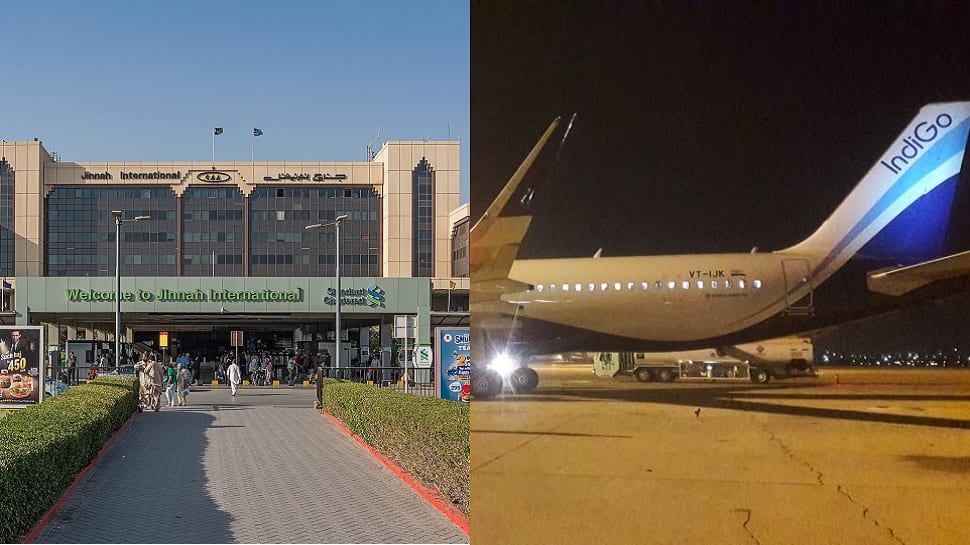Why Indian airlines SpiceJet, IndiGo made emergency landing in Pakistan? On
On July 17, a Sharjah-Hyderabad IndiGo flight made an emergency landing in Pakistan’s Jinnah International Airport in Karachi. The pilot of the flight 6E-1406 observed a technical defect in the aircraft and as a precaution the aircraft was diverted to Karachi, Pakistan. An additional flight has been sent to Karachi to fly the passengers to Hyderabad. A few days earlier, a SpiceJet flight SG11 made an emergency landing at Karachi airport. The Delhi to Dubai international flight suffered a technical fault and made the landing at the Pakistan’s Karachi airport on July 5. A flight ferried the passengers to Dubai later in the day. More than 150 passengers were present onboard the Boeing 737 MAX aircraft.
Two flight incidents in the past few days have raised questions on the safety of the Indian airlines and DGCA has already ordered a probe in the rising number of emergency landings. More than that, the question arises, why are Indian Airlines choosing to land in Pakistan despite India having no such agreement with the neighbouring country?
India and Pakistan are adversaries and there’s no direct flights between the two nations. Any passenger who is willing to travel to either of the countries have to first travel to any Middle Eastern country like Dubai, Abu Dhabi, Sharjah and change flight to either of the nations. Regular citizens can’t even travel to either of the countries on a tourist visa.
So what makes Indian airlines like SpiceJet and IndiGo select Pakistan for emergency landings. In both the cases, the flights involved were travelling between Gulf and India and the only flight route between India and Gulf nations either passes through Pakistan or over the Arabian Sea, adjacent to Pakistan.
IndiGo Sharjah-Hyderabad flight diverted to Pak’s Karachi after pilot reported technical defect in the aircraft which is being examined at the airport.Airline is planning to send another aircraft to Karachi.
This is the 2nd Indian airline to make a landing in Karachi in 2 weeks pic.twitter.com/XbUcgNOzBs
— ANI (@ANI) July 17, 2022
India and Pakistan signed an Airspace Agreement in 1991, allowing commercial airliners to use each other’s airspace to travel to other nations, in order to save fuel and time. While the airlines don’t use the airports on the neighbouring land, they do use the airspace for travel. Back in 2019, after the Balakot strikes, Pakistan blocked Indian airlines from using their airspace.
This resulted in Air India, the sole air carrier operating international flights over the Pakistani airspace loose as Rs 500 crore in additional fuel. Not only this, IndiGo also couldn’t start its Delhi-Istanbul flight. This means, Indian airlines travelling towards the Middle East and Europe can’t avoid Pakistani airspace.
As it happens, if something unwanted happens mid-air, airlines have no other option to contact Pakistani ATC and ask for permission to land on one of their airports. The Pakistani authorities can’t deny permission as under the agreement signed, airlines can land in either of the counties in case of an emergency.
In the case of SpiceJet flight, it was travelling over the Pakistan when the snag was faced, in the case of the IndiGo flight, the plane was close to the Pakistani airspace when the malfunction was detected and had no other choice to contact ATC and land in Pakistan.
Had the snag been detected later, the pilot could have opted to land in any of the nearest airports in India. Or, if the snag was detected earlier, the pilot would have performed a go around and return back to Sharjah airport.
During the SpiceJet incident on July 5, the company said that it was horrifying few hours to arrange another flight and fly out passengers out of Karachi due to India-Pakistan relations. While enmity between the two countries make the diplomatic channel difficult and a nightmare for air carriers in case of emergency landing, there’s no other choice but to land at the nearest possible airport to avoid any unfortunate event.
Live TV
For all the latest business News Click Here

